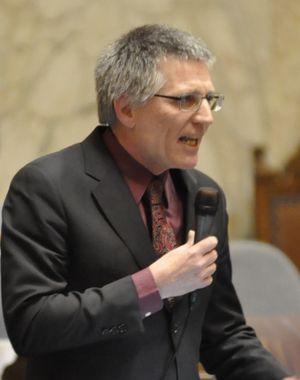WALeg Day 51: House passes $12 minimum wage
OLYMPIA – Washington would raise the minimum wage for most workers to $12 an hour by 2020 under a bill that passed the House Tuesday after a spirited partisan debate.
Democrats said it was a way to give workers at the bottom rungs of employment a chance to pay their way out of poverty. Republicans said it would make it even harder for young workers to get their first jobs and the work skills that would serve them later in life.
The bill would raise the state’s current minimum wage of $9.47 an hour in steps, to $10 next Jan. 1, $10.50 a year later, $11 the year after that and $12 on Jan. 1, 2020. But it faces a tougher test in the Republican-controlled state Senate, whose leaders said two hours before the House vote Washington already has the highest minimum wage of any state in the nation, and they support lowering that for teenagers and young trainees.
The $12 an hour limit would receive a “chilly” reception from the majority Senate caucus, Sen. Linda Evans Parlette, R-Wenatchee, said.
House Republicans tried repeatedly to change the bill, offering 13 amendments for things like lower teen wages, taking a longer look at inflation or varying the wage around the state to account for differences between the boom economy of the Central Puget Sound and high unemployment in some rural areas. Most were ruled outside the scope of the bill by House Speaker Frank Chopp and didn’t receive a vote; the few that did were rejected on partisan splits.
Rep. Joe Schmick, R-Colfax, said raising the minimum wage would be hard on farms and rural economies which can’t easily pass along their higher costs. “They will hire less kids,” he warned.
But Rep. Timm Ormsby, D-Spokane, said teens have been crowded out of most minimum wage jobs as the state has required welfare recipients to find employment through programs like Work First. The increase would help people in his Central Spokane district said who rely on state programs that have “hacked and slashed away” in recent years because of budget crunches.
“This is a floor raise, and a modest increase,” Ormsby said.
Rep. Jessyn Farrell, D-Seattle, the prime sponsor of bill said the minimum wage is paid overwhelmingly to adults, unlike past generations when it may have gone mainly to teenagers. Adults who work a full week should be able to earn a wage that covers food, clothing, housing and medical care, she said, adding “You should be able to pay your own way.”
Rep. Matt Manweller, R-Ellensburg, who emerged as the bill’s chief critic, accused Democrats of being “economically illiterate” and ignoring the economic law of demand. If raising the minimum wage would stimulate the economy as much as some supporters said with no ill effects, why not raise it to $50 an hour? he asked.
Democrats often accuse Republicans of being anti-science, said Manweller, a professor at Central Washington University. “If you vote for this bill, you lose that right.”
But vote they did vote for it, and the bill passed with 51 yes votes from Democrats and 46 no votes from Republicans.

